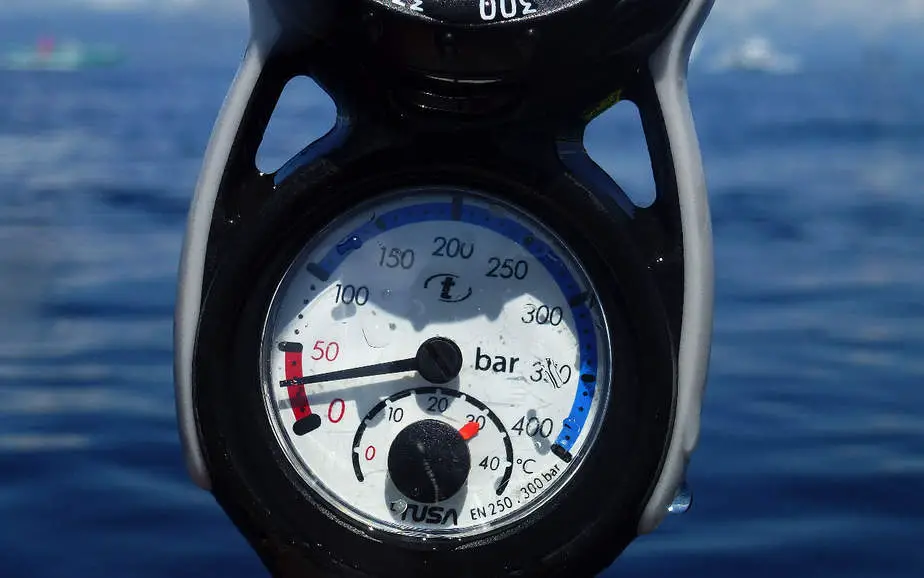After considering whether you want to rent or buy gear, you’ve come to the conclusion: you want to have some scuba gear of your own. Now, there’s a new problem: what scuba gear should you buy first?
There are numerous considerations you need to keep in mind before you take the plunge and buy something you might end up regretting.When deciding which scuba gear you should buy first, you should consider the types of diving you’ll be doing, where you’ll be diving, and how you’ll transport your gear between dive destinations.
If you’ll be traveling by plane, you should prioritize buying smaller items that are easier to pack such as mask, snorkel, fins and dive computer, and just rent the rest at the destination (e.g. wetsuit, BCD, scuba tank). Most divers will agree that the order to buy scuba gear should be something like: mask, snorkel, fins, wetsuit, dive computer, regulator, BCD, and dive accessories (e.g. dive torch, tank marker lights, dive knife).
For many divers, the process of shopping for their scuba gear for the first time can be overwhelming with the sheer amount of options available. For many people, they have to stay under a certain budget, and when every piece of equipment has its uses, which one should you prioritize?
In this article, we will help you answer the question of when you should start buying dive gear, in what order you should buy the equipment, and even a little bit about what to look for. We also briefly discuss where you can buy your scuba gear. There’s a lot we will be covering, so without further ado, let’s get into it.
Before you buy – considerations to keep in mind
What types of diving do you do?
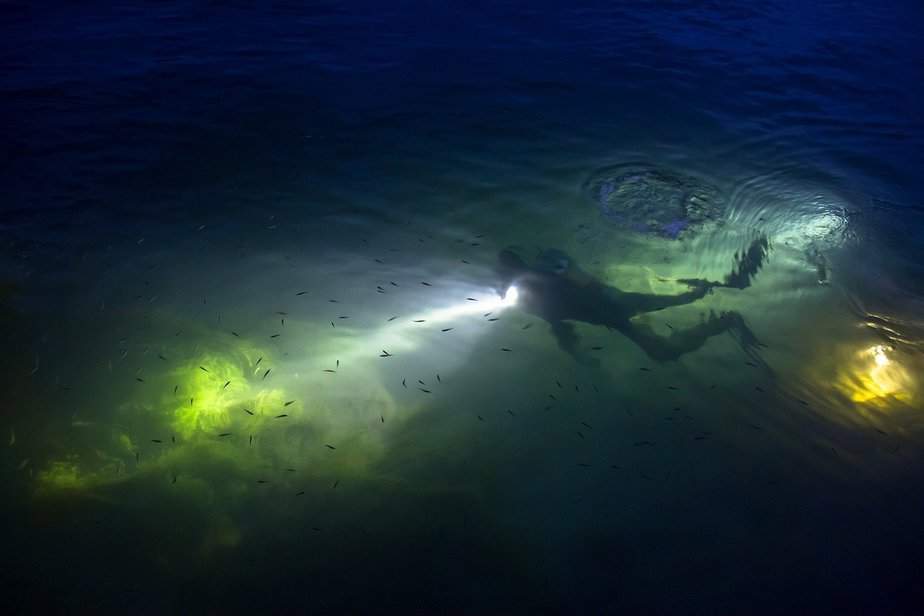
Do you tend to dive in tropical or temperate waters? Do you do more saltwater or freshwater diving? Do you prefer shore dives or boat dives? How about diving during the day or at night? Where will you be traveling with your dive gear?
If you will be traveling by plane, you should hold off on buying the larger items such as fins and BCD because they will take up significant luggage space. Instead, your priorities should be the mask, snorkel, dive computer, and regulator. The rest of the gear, you might never need to buy if you only scuba dive on vacation. Instead, rent them from a dive shop at the destination you plan on vacationing in.
These are just some of the questions you should be asking yourself while shopping for new scuba gear. Some equipment will serve you better depending on the conditions you will be diving in and how you plan on using them.
How often do you go diving?
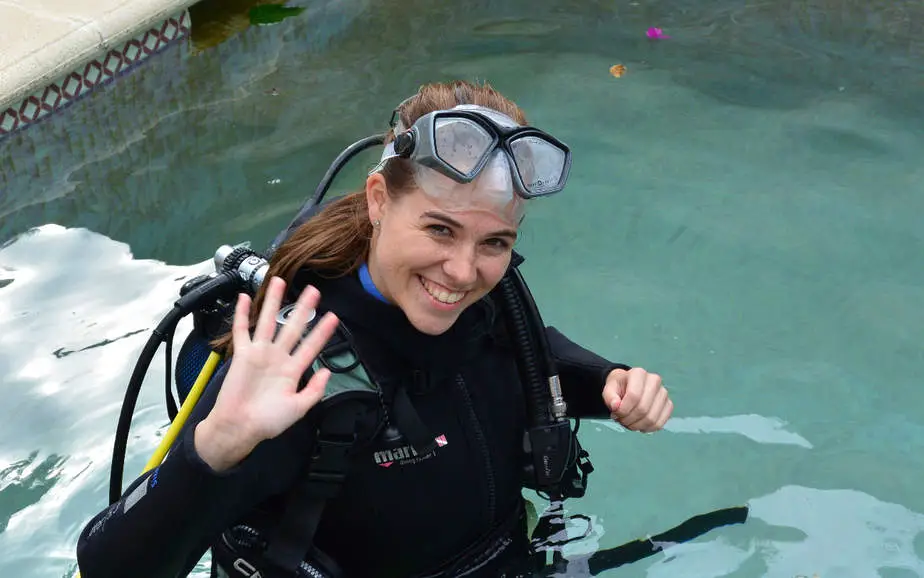
The frequency in which you go diving will also affect the quality of the gear you should buy.
For instance, if you dive every weekend, then you should invest in high quality gear that is durable and can last a long time. The upfront cost will quickly be worth it if you factor in how much it’d cost you to rent each time you dive; if you rent 30 times, the cost will approximately be the same as buying a full set of scuba gear outright.
On the other hand, if you are a seasonal diver and only dive during your annual trip, then you probably want a more budget and travel-friendly set of gear. For instance, fins can come in a more travel-friendly variation, however the trade-off is that it’s not as effective underwater. Even BCDs have compact versions.
What’s your budget?

Unfortunately, even though there are many considerations, for a lot of people the most important one is budget. Scuba diving is an expensive hobby, so sometimes a choice is made based on budget constraints.
If this is the case for you, then you might want to consider buying bits and pieces of your scuba kit over time. You should also consider buying second-hand gear from divers who are either looking to upgrade or who have lost their passion for diving.
Typically, a full set of scuba gear can cost around $1,000 to $2,000 USD. The range discrepancy depends on what kind of quality and features you want, plus if you want to buy the full kit or bits and pieces and you’ll rent the rest. When renting, the typical price is around $30 to $70 a day.
What after-sales service is available?
When purchasing scuba gear, you should look into what warranty the product comes with, if any. If you have any issues with the product, are you able to get it fixed or replaced easily, or are you out of luck? Not all brands offer the same warranties. Does the brand you are buying from have a service center nearby for you to send gear in for maintenance? Are there replacement parts that you can readily purchase?
What are your goals?
Since scuba gear is a hefty investment, you need to consider your long term goals. Do you plan on getting more certifications and diving under more extreme conditions? Do you plan on travelling all across the world, diving in various environments that require more protection? Do you plan on taking up a hobby within a hobby, such as underwater photography or scuba spearfishing?
If you plan on doing things beyond recreational scuba diving, you should invest even more time into researching your gear. You might want to save up for high quality products for these specialized scuba activities. This way, you don’t need to constantly upgrade your old gear if you just buy the correct one the first time around.
What order to buy scuba gear
Does the order in which you buy your scuba gear matter? It depends on your situation. If you have the money, it doesn’t really matter as you can just buy a full set in one go! However, if you prefer to build your kit piece by piece, then we recommend starting with the more affordable items and slowly working towards the more expensive items.
Mask, snorkel, and fins
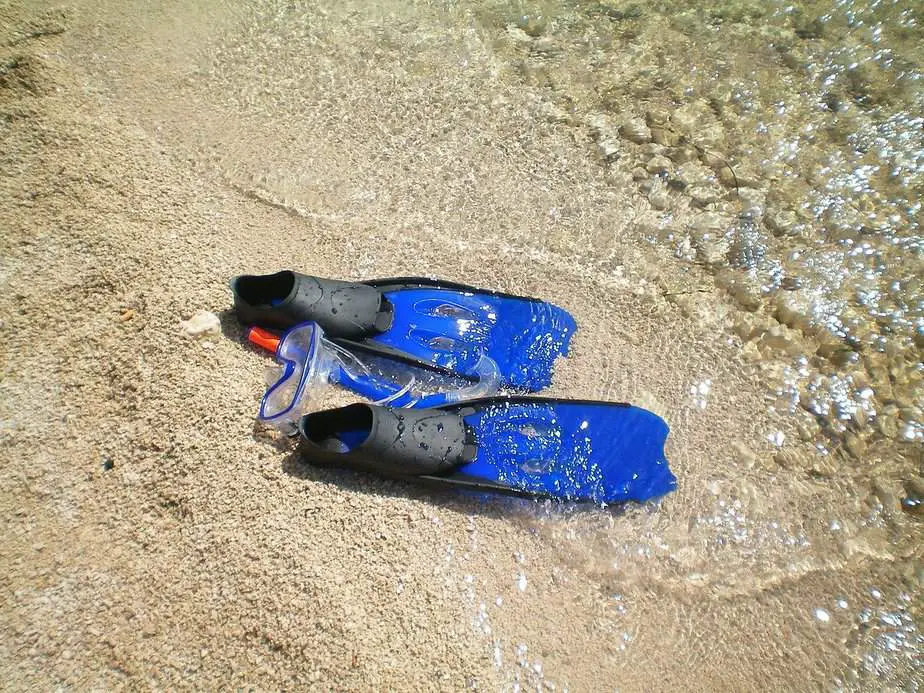
The mask, snorkel, and fins are the three items that are the best bang for your buck. They are widely available and are the most affordable. Particularly when it comes to the mask, it is very important because if you own a mask, you can guarantee it fits you well and doesn’t leak compared to a rental mask.
These items are also the most versatile items because as you might have noticed, they are exactly the same as the essential items required for snorkeling. One distinction is that when it comes to fins, get a pair that is designed for scuba diving. Snorkeling fins tend to be shorter and flimsier which is great for travel but not so great when scuba diving.
Having your own set of mask, snorkel, and fins means you don’t have to rent them when traveling. They are also relatively easy to pack for travel and can therefore save you some money and effort.
Even if you don’t end up scuba diving, you can use these three items to still go snorkeling. You can hit the beach at your convenience and still see the underwater world one way or another. You can’t really go wrong with getting a mask, snorkel, and fins – they are important items that are also relatively affordable, so buy them first.
Some divers believe that a snorkel is unnecessary for scuba diving. They argue that a snorkel is only useful at the surface to conserve air, but once you’re underwater, it just gets in the way and increases drag. If you’re shore diving, you should definitely use a snorkel so you don’t waste precious breathing gas swimming to the diving area. If you’re diving from a boat, then it’s up to you. By the way, you probably should not get a dry snorkel for scuba diving – the float valve can potentially trap air inside the snorkel tube and increase your drag and buoyancy even further.
Exposure suit (wetsuit or drysuit)
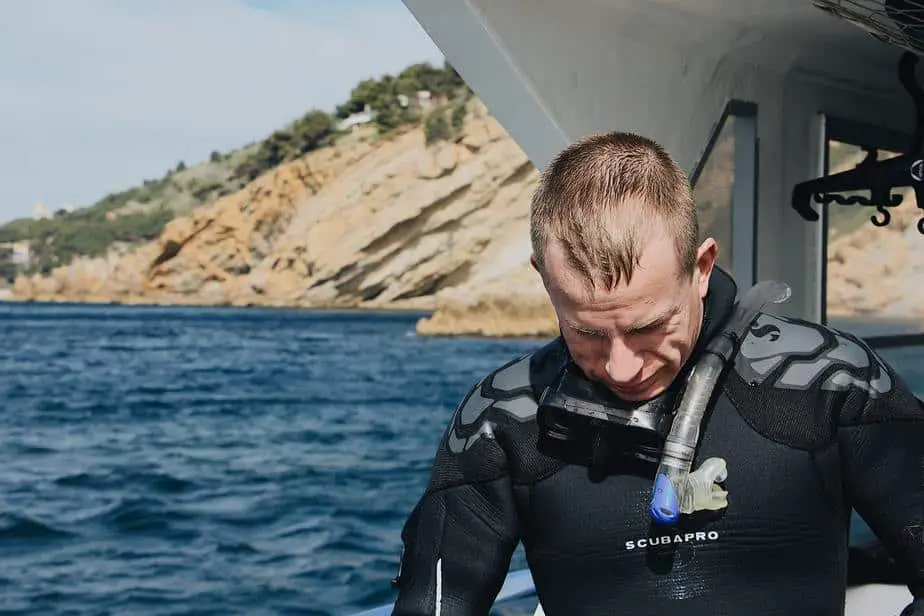
Your next priority is to get a wetsuit that fits you properly. A well fitting wetsuit is not only comfortable, but effective; it can only keep you insulated if it has a snug fit.
It’s great to have your own wetsuit because renting one can be a bit of a pain. Dive shops don’t always have the right size for you, and you cannot be sure if they thoroughly sanitized the wetsuit. Can you imagine how many people have worn the wetsuit before you? How many of them do you think peed in it? Ok, maybe don’t think too hard about it.
If you cannot get a wetsuit that fits you properly, then you will struggle to stay warm and this alone can prevent you from diving. Additionally, if a wetsuit is too tight or rubs uncomfortably against your skin, this can greatly detract from your enjoyment of diving.
With your own wetsuit, you can spend the time upfront finding the perfect wetsuit for your body shape. Take all the time you need to find a wetsuit that fits you snug, keeps you warm, feels comfortable, and doesn’t restrict your movement. If you expect a rental wetsuit to tick all of these boxes, you will likely be disappointed.
As for a drysuit, you do not have to be as strict. Basically any drysuit will work since they are intended to fit loose and baggy. What’s important about a drysuit is not the drysuit itself, but rather what you wear underneath the drysuit.
Dive computer
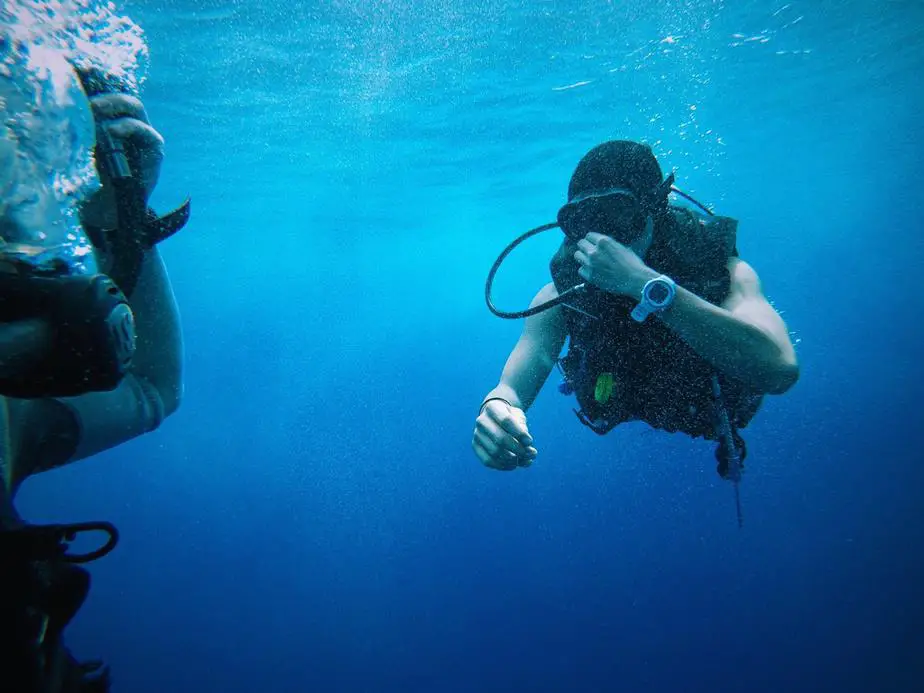
The next purchase you should get that is yet another step up in terms of price, is a dive computer. There is some debate here regarding when to buy one; some divers recommend getting one ASAP, others like myself consider a dive computer to be a big investment. For a new diver who is unsure how much they want to commit to this sport, a several hundred dollar dive computer might be something they want to hold off on.
However, if you’ve made up your mind and are willing to start investing the big bucks into your scuba diving gear, then the first one to get is a dive computer. Dive computers are a relatively new invention, only becoming widely available in the last couple of decades or so. Now, they are an essential piece of dive equipment.
Dive computers are designed to help divers avoid decompression sickness (the bends). They provide real-time information about your dive such as your no-decompression limit (NDL), dive depth, elapsed time, and much more. It stores this information into its memory and creates a dive profile based on your past dives.
Even an entry-level dive computer has many safety features such as alarms and a conservative algorithm which will ensure you surface while the risk of decompression sickness is low. The alarms can warn you about your approaching NDL, if you’ve exceeded your max depth, if you’re ascending too quickly, if you’re running low on air, how long your surface intervals should be, and more.
Surprisingly, many dive shops do not offer dive computers for rent. Plus, even if they did, the information the dive computer provides will not be as accurate since it is gathering data from a clean slate. If that dive computer hasn’t been reset, then it’s using another diver’s profile and giving that information to you which is inaccurate and dangerous. If you value your own safety when diving, get your own dive computer and use it on every dive.
Regulator and BCD
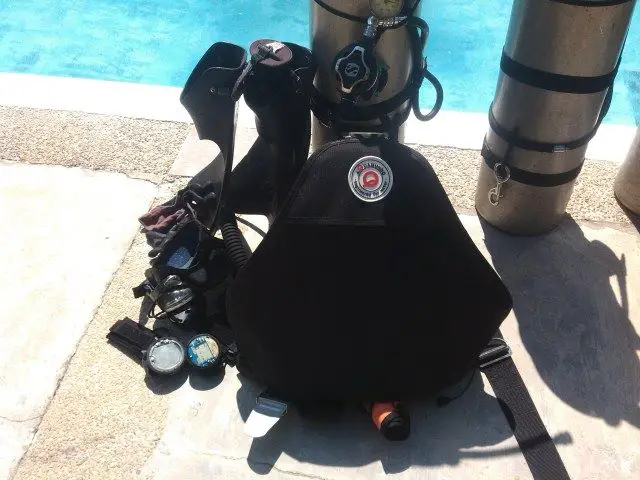
The regulator and BCD are extremely important pieces of gear to buy – you could say they are basically the core tools needed to scuba dive. Even a dive computer technically isn’t required depending on who you ask, but how can one dive without the iconic regulator or a BCD to control their depth?
Despite how crucial they are, we do not list them as the top priority because they are expensive and bulky. Up until now, the items were small enough that you could still bring them with you easily on an airplane, however the BCD is when things start to get tricky. Theoretically, you don’t need to even buy a BCD and just rent one at the destination.
Thus, out of these two, I recommend buying the regulator first. It can also be easily transported, and it can ensure proper hygiene and safety compared to rental regulators. While most dive shops have strict sanitation protocols, having one of your own will feel more reassuring. Regulators also need to fit comfortably, so that’s another problem taken care of if you have your own.
To complete your core scuba kit, you need a BCD. You can select between a jacket type or back-inflate BCD or even a hybrid type. Most dive shops will carry jacket style BCDs so if you are unsure, you can easily test it out by renting it. There is a debate about which style is best and many argue in favor of back-inflate, so don’t rule that one out either.
Dive accessories
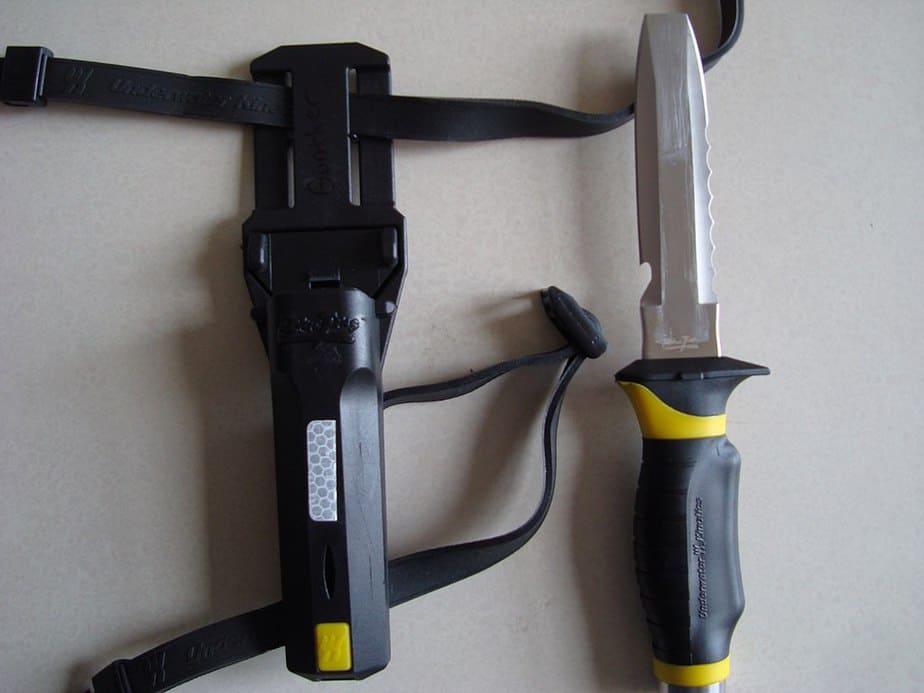
Finally, even though we are recommending you buy these last, it does not mean they are unimportant, as all scuba gear serves some purpose, otherwise you wouldn’t bring them with you on a dive. Some of these items are essential, while others are nice-to-haves.
If you could only buy one dive accessory (and you would rather rent the rest), then I recommend you purchase a delayed surface marker buoy (dSMB). Many dive shops do not have dSMBs available to rent, so for your own safety, it’s better to have your own.
Those of you who prefer night diving or who dive where light visibility is an issue should get yourself a reliable dive torch. Remember to also have a backup light in case your primary light dies. Speaking of lights, it’s also a good idea to get scuba tank marker lights to increase your visibility.
Yet another great dive accessory is the dive knife or trauma shears. One of the hazards of scuba diving is entanglement; you never know if you will get caught in a net or some other hazard. A dive knife can potentially be a hazard to yourself if you don’t know how to use it, so trauma shears are a much safer alternative that will reduce the risk of cutting yourself.
Now, depending on who you ask, the next items are either absolutely a waste of money or essential diving gear, and that’s any underwater photography equipment. Admittedly, underwater photography is not really my thing; the most I’ll do is use a GoPro to record some videos. What can I say, I can be lazy and cheap sometimes. However, I can perfectly understand the desire to preserve a memory forever.
Underwater photography is like a hobby within a hobby. It’s perfect for when you think diving alone isn’t exciting enough, and now you want to add even more complexity to this sport. However, the rewards are definitely worth it judging by all of the beautiful pictures and videos of the underwater world. Surely photographers have done more for attracting newcomers to this sport than any other group.
That said, if you know anything about photography equipment, you’ll know that it’s a hobby that could easily surpass scuba diving in terms of equipment costs. A DSLR camera body could already cost over $1,000, and that’s the cheap part of it. Imagine how much the lenses cost, or the lights, or the underwater housing, and so on. Traveling with all of this equipment would be an absolute nightmare as well.
As such, camera equipment cannot be considered essential diving equipment unless you are passionate about photography and scuba diving. For the vast majority of people, it’s not something they can even consider due to budget constraints.
Scuba cylinders
If you’re a recreational diver, scuba cylinders are probably last on your list of priorities. You can simply rent a tank from a dive shop; they are a dime a dozen. That said, most rental tanks are AL80 tanks. If you want to dive with a steel tank, or one with a larger capacity, then you need to buy your own scuba tank.
Due to how bulky, heavy, and space-intensive a scuba tank is, as well as how much maintenance is required to keep it in tip-top shape, it’s not a good idea to buy one if you aren’t prepared to deal with all of the hassle it comes with. You don’t want it to end up taking up space in storage for years, do you?
Where to buy scuba equipment
Local dive shops
Nowadays, finding local dive shops is easier than ever. If you just google “dive shops near me” and enable location services by clicking “allow” in the box that appears, you can easily find all the nearby dive shops along with customer reviews and pictures.
I am a firm believer in buying local and supporting brick and mortar stores, so before you head to a mega retailer, check out the smaller guys first. Also, buying in person gives you the opportunity to try on the gear to get a better fit. Depending on the store, there might even be a pool for you to test out the gear.
It’s a good idea to establish a relationship with the people at your local dive shop since you will likely go to them if you need more equipment down the line, or if you require repairs or service needs. Plus, being personable with the staff means they are likely to give special packages or promos to their favorite customers.
Just by having casual conversations with the dive shop employees, you not only build rapport, but also you will generally have interesting conversations with like-minded people who also love to scuba dive. You might be able to get insights and feedback on certain products that the average person wouldn’t know about. They are also likely to drop any sales act once they are closer to you, and this ensures you get the smoothest buying process for all subsequent purchases.
Online retailers
We’ve already done our little spiel about buying local, so let’s move on to the next option: buying online. The downside to shopping online is that you can’t try out the gear before you buy, and your only reference is a sizing chart which may or may not be accurate.
When shopping for gear online, you must ensure that the return policy is good. Amazon is known for its generous no-questions-asked 30-day return policy. For example, you can buy a mask, get it delivered within a couple of days (I often get things delivered on the same day) if you have Prime shipping, try it on, and return it if you don’t like the fit or it has some kind of defect.
To increase the likelihood that an item purchased online will fit you on the first try, read the customer reviews. Pay particular attention to people who give out their height and weight or any other measurements and how well they claim the item fits them. Some reviews might recommend you size up or size down or to try another brand entirely.
If you want the best deals shopping online, you have to be a patient shopper. Online stores typically have seasonal sales, particularly during the end of the year such as Black Friday and Cyber Monday and of course the Christmas holidays. However, new deals can appear spontaneously, and we recommend signing up for each store’s mailing list so you can be notified of any deals or coupons.
Buy second hand
Depending on who you ask, buying second hand is either a great way to save money or a great way to get scammed. Your mileage may vary; there are many horror stories of people buying shoddy gear that doesn’t work and having to fork over even more cash to buy a replacement. For others, it’s a great way to get a good discount (but not too good, because that’s suspicious) on gear that is basically still in mint condition.
When you’re buying second hand, you want to buy from people who are quick to upgrade their gear or get rid of gear that’s just sitting unused in their storage. In other words, you want items that were barely used by their previous owners before exchanging hands to you. This ensures the quality is still like new and that you most likely got it for well below market price.
The usual places to buy and sell second hand equipment are Craigslist and Ebay. However, in recent years, Facebook Marketplace has been a boon in the second-hand market. You can also join Facebook groups that are expressly for buying and selling scuba equipment. Facebook can let you see the seller’s profile and if that user is active in the community, it further decreases the chance of it being a scam.
If you happen to have a bunch of diving buddies already, then you can ask if any of them are looking to upgrade their gear because you are willing to pay a good price for their old gear. It’s really important to offer a fair price and not to haggle for a lower price on the basis that you are good friends, so you deserve a “friend” discount; that’s a good way for someone to lose respect for you. It also makes things awkward for your friend, so don’t force it.
Dive shows and exhibitions
Lastly, you can potentially get good deals on scuba gear at dive shows and exhibitions. This is a great opportunity to learn more about the items you’re looking to buy, see the latest offerings in the scuba market, and potentially get these items at an exclusive discount.
Scuba brands like to market their new products at these venues and, in order to make a good impression, offer their items for sale after an impressive showing. This is where you can get excess stock at bargain prices.
If you happen to live close to where a dive expo is held, make a quick visit to check out the show and also possibly snag a few items at a low cost.
Summary
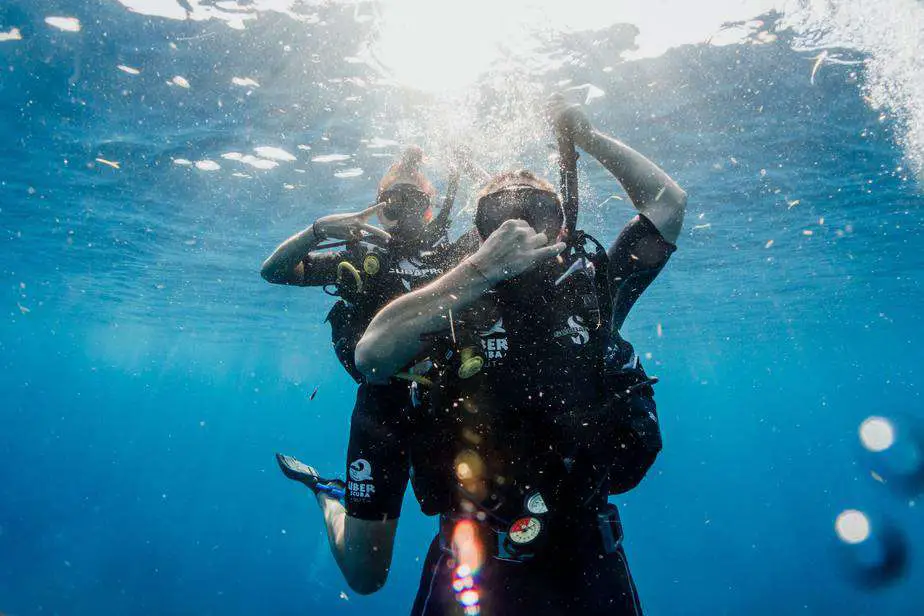
Don’t worry if you can only buy your scuba kit one piece at a time. There’s no need to be clad in new scuba gear as soon as you get certified. In fact, it’s very rare for a diver to go out and buy their entire kit at once.
If you are still new to scuba diving, it may be better for you to rent gear the first few times so you can get hands-on experience with the equipment. That way, when it comes time to do your own personal shopping, you’ll know exactly what you want.
You should also consider how often you’ll be diving, the types of diving you want to do, and where you’ll be traveling to. If you only scuba dive during your annual vacation, there’s hardly a need to buy literally every piece of scuba equipment; just the essential ones that are also easy to travel with such as mask, snorkel, fins, dive computer, and regulator. You can just rent dive weights, a BCD, and tanks at the destination.
Unlike snorkeling, renting scuba gear is legitimately a great option since it makes traveling so convenient. No more worrying about luggage issues or being stopped by airport security. This is assuming that you are traveling the world to scuba dive. If you are diving locally, then it becomes a better idea to own a full scuba kit since you can easily load it into the trunk of a car and bring it with you to nearby dive sites.
When choosing what gear to buy first, a mask and regulator are at the top of the list. You definitely don’t want to rent a mask that leaks or use a regulator that free-flows and is possibly unhygienic. By prioritizing a mask and regulator, you can minimize a disastrous outcome when you’re renting scuba gear. You can finesse your way around most other problems, but mask and regulator issues can easily end your dive.

